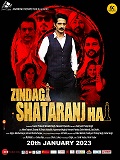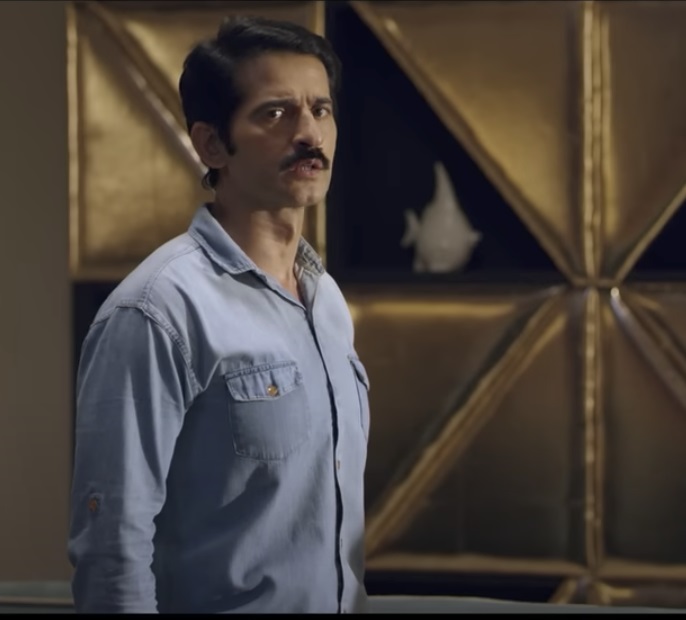|
|
||
|
Pro Tools
FILMFESTIVALS | 24/7 world wide coverageWelcome ! Enjoy the best of both worlds: Film & Festival News, exploring the best of the film festivals community. Launched in 1995, relentlessly connecting films to festivals, documenting and promoting festivals worldwide. Working on an upgrade soon. For collaboration, editorial contributions, or publicity, please send us an email here. User login |
Zindagi Shatranj Hai, Review: Partly chess, partly mess
Zindagi Shatranj Hai, Review: Partly chess, partly mess With a title like Zindagi Shatranj Hai (Life is a game of chess), you are ready to watch some smart moves, and the film does offer a few such moves. But it also offers several false moves that negate the positive ones. Designed as a mystery-suspense-thriller, it has a plot within a plot within a plot. Besides that, there is pretty little in terms of good cinematic content. There are many loose ends that are left untied and several threads are left unravelled. The best part of the film is its length, at 85 minutes, which helps manage the main plot points, without many side-tracks. But even at that short duration, several scenes are redundant and some of them go nowhere. Vishal and Kavita Malhotra live in a large house with a servant named Vasu. Vasu is a shirker, and the couple often scold him. He wants leave to go to his village, but it is not granted. The couple even refuse to give him a day’s leave. Vishal, a big businessman, leaves for the USA, and Kavita joins him in the car, to see him off. After she returns, she is shocked to find a man in her bed. A stranger to her, this man claims to be Vishal. Vasu confirms that he is indeed Vishal, and he came back because his flight got cancelled. Nothing she says or does has any effect on the stranger, who insists that he is Vishal. Kavita calls the police. The police ask the stranger for proof, and he produces all kinds of proof: PAN Card, Aadhaar Card and Voting Card. Kavita is dumbfounded that all the pictures of her husband have been replaced by those of the stranger, including those on her wedding album and her mobile phone. The police dismiss the case as one of amnesia attack, under which Kavita is hallucinating. For his part, the stranger makes himself comfortable, and at home. Kavita cannot believe that their long-term servant, Vasu, is in league with the intruder, and accepts and addresses him as his master, following his orders. How does she get this imposter out of her home? Who is he? Why is he doing this? Story, screenplay and dialogue writer M. Salim seems to believe that the plot within a plot within a plot is enough, and the audience will not worry about loose ends. In other words, the story is key while the screenplay is not so important. On the contrary, the screenplay is probably more important. How are you saying it is more important than what you are saying, when it comes to cinema! So many questions are left unanswered. Why did nobody check whether the USA flight was cancelled? If so, did Vishal not call Kavita or come home? Did he board the next flight? Why does Kavita not take the imposter to Vishal’s office and settle the matter? Why does she not call her woman friend, who is referred to twice during conversations, and confront the imposter? Who were the black, masked men who appeared in Kavita’s bedroom, her car and by the roadside? How did they know she will run exactly in that direction? Why does the imposter put on an act while pretending to get knocked out by a spiked drink, when nobody was watching? Dr. Shah is an eminent surgeon, yet he is the psychiatric consultant to the Malhotras, not probable at all. The police seem to have only two cases at hand: that of an ATM thief and that of Kavita Malhotra. Whenever she calls, and she calls them often, 4-5 of them respond, which is quite unnecessary. A woman sub-Inspector gives Kavita her card. Later, she dials a number that is allotted to Inspector Raj. Where did she get his number? Inspector Raj pretends to hug the imposter and sniff him as part of detection technique, to know what perfume he is wearing, perhaps to compare it with the perfume Vishal used to wear. Is he an expert at sniffing perfumes and identifying their brands, as is implied? It would be amazing if he was. Ably handling his lead actors, director Dushyant Pratap Singh shows little control over his supporting cast. They often get out of character and are given inane, perfunctory dialogue. Even a senior performer like Hemant Pandey, who plays Vasu, appears silly in some scenes. In any case, his role is too big for this kind of film. Another issue is ending of one scene and the beginning of another. This aspect leaves much to be desired. Placing red herrings along the narrative works only if they are justified in the end. What we learn in the end does not justify the means, and the victimised person could have got justice without going through the whole rigmarole. At one point, one character points a gun at another, in a public place, and intends to kill him. How does the killer hope to escape unnoticed and not get caught? Kavita asks Mishra to meet her at a Club, quite unnecessarily, very obviously, to create a song situation.
Hiten Tejwani is confident as the imposter. Shawar Ali as Saurav has only one scene, and looks his part. Pankaj Berry as Dr. Shah is introduced in a villain style and is wasted in the role of Dr. Shah. Zahid Shaikh as Vishal Malhotra is on the plus size side and has three scenes, which he delivers well. Ashutosh Kaushik as Inspector Raj is not totally convincing. Ekta Jain as sub-Inspector Leena is almost a caricature. Rajkumar Kanojiya as Hawaldar Kadam is made to play it like a funster. Hemant Pandey as Vasu has a meaty role, and is in his element most of the time. Sometimes it appears that he is trying to improvise some lines to bring the scene to a close, and that jars. Also in the cast are Kavita Tripathy, Ashutosh Kaushik, Bruna Abdullah and Arjuman Mughal. Cinematography by Suhas Rao has its due share of tilts, pans and tilt-pans. Most scenes are indoor, and lit-up accordingly. Editors Sunil Yadav and Arun Yadav are unable to find too many good cutting points, partly due to the scenes ending on an incomplete note. There is no rapid cutting, as might be expected in a mystery-thriller, except when Kavita sees those masked men. Daler Mehdi makes an appearance in the opening item song, titled ‘Gadbad’, while there is another item number towards the end, titled ‘Badnaam’, in a club. Tunes for these songs have been composed by Anjjan Bhattacharya and Indrani Bhattarcharya. Singers are Daler Mehdi, Dushyant Pratap Singh and Neha Singh, while the lyrics are by Kumaar and Ajay Bawa. All have done a good job. ‘Gadbad’ is repeated in the end credit titles. Background score by Chandrashekhar is average. Choreography by Chhotu Lohar is of the standard item song type, but vulgarity is absent. The censors have granted the film a U/A certificate, and that is fair enough. Zindagi Shatranj Hai moves it pawns initially in the right directions, but in the end, it is partly chess, partly mess. Rating: ** Trailer: https://youtu.be/bRjIMiU_yhs 21.01.2023 | Siraj Syed's blog Cat. : Ajay Bawa Anjjan Bhattacharya Arjuman Mughal Arun Yadav Ashutosh Kaushik Bruna Abdullah Chandrashekhar Chhotu Lohar Daler Mehdi Dushyant Pratap Singh Ekta Jain Hemant Pandey Hiten Tejwani Indrani Bhattarcharya Kavita Tripathy Kumaar M. Salim Neha Singh Pankaj Berry Rajkumar Kanojiya Suhas Rao Sunil Yadav Zahid Shaikh Independent FILM
|
LinksThe Bulletin Board > The Bulletin Board Blog Following News Interview with EFM (Berlin) Director
Interview with IFTA Chairman (AFM)
Interview with Cannes Marche du Film Director
Filmfestivals.com dailies live coverage from > Live from India
Useful links for the indies: > Big files transfer
+ SUBSCRIBE to the weekly Newsletter Deals+ Special offers and discounts from filmfestivals.com Selected fun offers
> Bonus Casino
User imagesAbout Siraj Syed Syed Siraj Syed Siraj (Siraj Associates) Siraj Syed is a film-critic since 1970 and a Former President of the Freelance Film Journalists' Combine of India.He is the India Correspondent of FilmFestivals.com and a member of FIPRESCI, the international Federation of Film Critics, Munich, GermanySiraj Syed has contributed over 1,015 articles on cinema, international film festivals, conventions, exhibitions, etc., most recently, at IFFI (Goa), MIFF (Mumbai), MFF/MAMI (Mumbai) and CommunicAsia (Singapore). He often edits film festival daily bulletins.He is also an actor and a dubbing artiste. Further, he has been teaching media, acting and dubbing at over 30 institutes in India and Singapore, since 1984.View my profile Send me a message The EditorUser contributions |





























